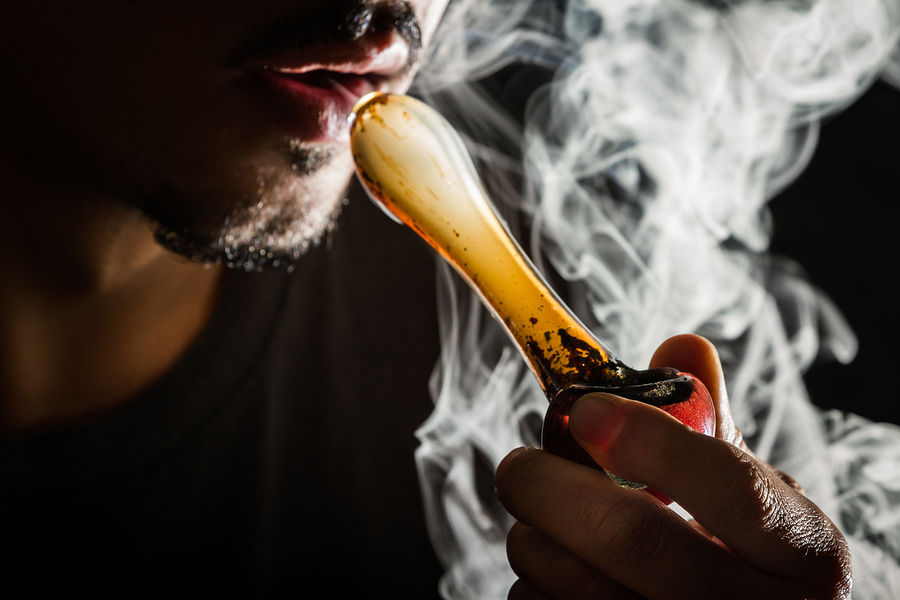 Marijuana is a drug derived from the Cannabis sativa plant, also called the hemp plant or cannabis plant. The leaves, flowers, stems, and seeds of the plant can be consumed through smoking them or by eating foods containing the plant, typically for the purpose of achieving a “high.” This high is a result of a compound in marijuana called delta-9-tetrahydrocannabinol, or THC. The amount of THC in marijuana varies between strains of the plant and between the types of marijuana products available.
Marijuana is a drug derived from the Cannabis sativa plant, also called the hemp plant or cannabis plant. The leaves, flowers, stems, and seeds of the plant can be consumed through smoking them or by eating foods containing the plant, typically for the purpose of achieving a “high.” This high is a result of a compound in marijuana called delta-9-tetrahydrocannabinol, or THC. The amount of THC in marijuana varies between strains of the plant and between the types of marijuana products available.
According to the National Institute on Drug Abuse (NIDA), marijuana is the most commonly used drug in the US. In 2013, 81 percent of illicit drug users reported having used marijuana in the last month. Sixty-five percent of drug users said marijuana was the only drug they used.
Can You Overdose on Marijuana?
Chances of overdose caused by marijuana are extremely small, in that it will not cause the same life-threatening symptoms as withdrawal from other drugs. It is possible, however, to consume enough of the drug to become very sick.
The effects of marijuana are felt immediately when the drug is smoked. If the drug is eaten, the onset is usually delayed by about 30-60 minutes. Marijuana edibles – food products that contain marijuana – deliver less THC into the bloodstream, and the effects may last for several hours. Effects from smoking marijuana last 1-3 hours.
Marijuana intoxication can cause not only the pleasant “high” most users seek, but also many unpleasant side effects. Common effects of marijuana intoxication include:
- Relaxation
- Sleepiness
- Euphoria
- Dry mouth
- Impaired perception
- Increased appetite
Effects of marijuana can become more serious if large quantities of the drug are used or if the individual has a low tolerance for THC. These effects can be more pronounced if the person has other mental health conditions or medical disorders. More serious effects can include:
- Panic
- Paranoia
- Acute psychosis
- Nausea and vomiting
- Shortness of breath
Marijuana purchased on the street is often cut with other, more dangerous drugs, including hallucinogens. Many of these drugs have very serious side effects. These can include:
- High blood pressure
- Chest pain
- Hyperactivity or violent behavior
- Heart attack
- Seizures
- Stroke
The effects of marijuana typically subside on their own and don’t usually require medical care. If side effects are severe, a medical professional may administer a sedative, such as benzodiazepine, to relieve feelings of panic or paranoia. Medical help should be sought immediately if you believe you, or someone else, have consumed marijuana that was cut with other drugs.
Is Marijuana Addictive?
Marijuana is often seen as carrying fewer risks than other drugs; despite this public perception, addiction to marijuana is not uncommon. Addiction to marijuana occurs as a result of repeated overstimulation of the endocannabinoid system within the brain; this leads to changes in brain structure and chemistry.
NIDA has estimated that about 9 percent of people who use marijuana become addicted. Risk of becoming addicted increases if the individual first uses the drug at a young age. In fact, 17 percent of people who begin using marijuana during adolescence become addicted. Daily users are at the highest risk, with 20-25 percent of people who use marijuana every day developing an addiction to the drug. Negative consequences of marijuana use also tend to be more severe if the drug is used frequently during adolescence.
Does Marijuana Affect Memory?
THC causes overstimulation of the endocannabinoid system, and this can affect many brain functions, including memory. NIDA lists the following effects of marijuana on brain function:
- Impaired memory
- Impaired judgment and thinking
- Feelings of euphoria
- Altered senses or experience of time
- Feeling very tired
Memory impairment as a result of marijuana use can be more severe among adolescents. THC can affect the development of the areas of the brain responsible for memory and logic, causing long-term damage. Repeated exposure to marijuana negatively impacts the hippocampus, an area of the brain responsible for forming memories, according to NIDA. Some of these effects may not be reversible.
